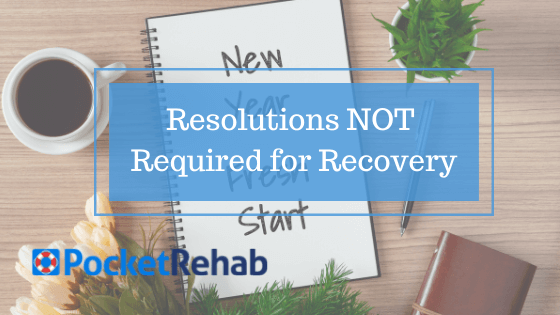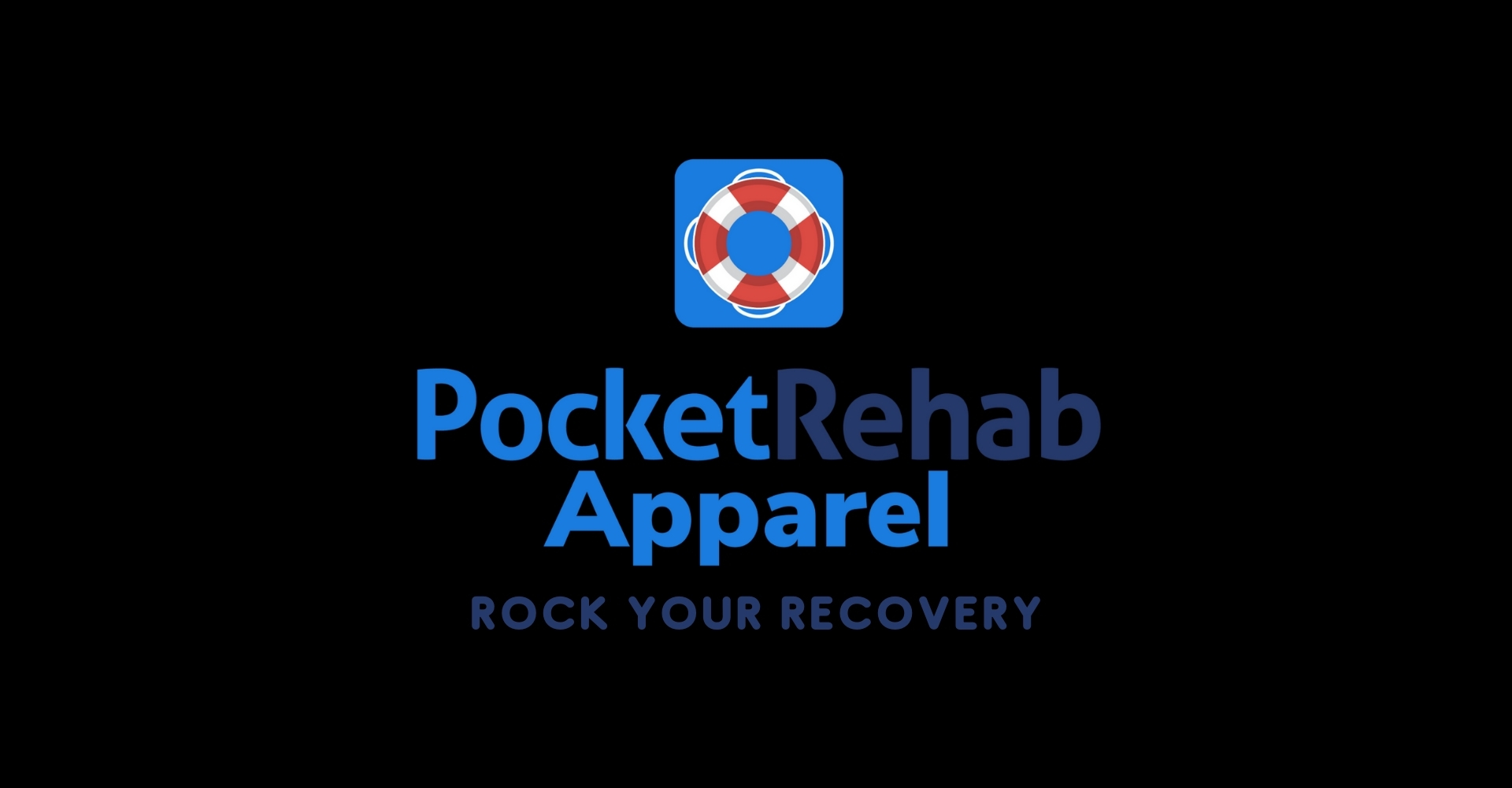Resolutions NOT Required for Recovery

It’s a new year, and as 2021 came to a close and we enter upon 2022, you’ll hear many people talking about the new year and their “New Year’s Resolutions.” Some will have a “word” or “phrase” for the year such as “Hope” or “Resilience” or even “Recovery.” Others will have big plans to quit drinking, stop smoking, eat less, exercise more, and the list could potentially go on and on. It seems like every year about this time gym memberships are discounted, people are all enthusiastic about their plans to change, to do better, and to excel in the New Year.
While resolutions are perfectly fine if that’s how you like to start each new year, I want you to know that:
Resolutions are NOT Required for Recovery!
Most Resolutions Fail
The reality is, a lot of resolutions fail and the truth is, change doesn’t happen overnight. I doesn’t happen just because it’s a new year. And it most certainly is not going to happen just because some one off resolution was made at the stroke of Midnight as we exited 2021 and entered 2022. Out of the 50% of Americans that make New Year’s Resolutions (many to quit drinking or to stop using their substance of choice), expects estimate that less than 8% of resolution-makers succeed in making long-lasting lifestyle changes after they promise themselves they’ll do better for the new year. In fact, here’s what the statistics for 2021 looked like:
- 75% of those who made resolutions stuck with it the first week.
- By week 2, only 71% of those who made resolutions were still hanging on.
- By the end of January, 36% of resolutions had already failed leaving 64% still holding on.
- Just about every study will tell you that by February, 80% of resolutions will fail.
But what so many don’t realize is that resolutions are NOT required for recovery! You don’t need to make any random promises to yourself. You don’t have to set unachievable goals just because it’s January 1, 2022. You most certainly can set goals if you want to, and you are more than welcome to have a special word or resolution or goal that you wish to achieve this year, but you absolutely should not feel obligated in any manner to do so!
Why Do Resolutions Fail?
If you are a resolution setter, this might be making you feel a little on edge and for good cause. I would worry too if I had just set an amazing goal for myself for the new year only to hear that basically every and everything is against me saying that I am doomed to fail. But not everyone is doomed to fail! In fact, ignorance is bliss, but education and knowledge is power! So, if you’re going to set resolutions, you’re going to need to know WHY they fail and HOW you can take steps to prevent yourself from becoming one of the 80% of resolution setters that give up by the end of February.
According to research by a psychotherapist, there are 3 very common reasons that apply to almost all New Year’s Resolutions which result in failure.
They are:
- Resolutions are Not specific enough.
- Resolutions are negatively worded.
- Resolutions are not relevant to the individual.
With these very specific reasons for your resolution to potentially fail in mind, let’s take a quick look at what can be done IF you want to set a resolution (but again, resolutions are NOT required for recovery!).
What to Do If Your Resolution isn’t Specific Enough
Goal setting is something that many business owners and entrepreneurs take entire courses about in order to learn how they can set specific goals that they can achieve not just in the New Year but in life overall. A primary type of goal setting that is frequently taught is “SMART” goalsetting. This stands for:
- Specific
- Measurable
- Achievable
- Relevant
- Time-Bound
To set SMART goals, the goal must be specific, you must have a method of measurement to determine success of the goal, it must be something that you are capable of achieving, it should be relevant to your overall plans for success, and it must be time-bound which means there is a definitive parameter of time within which you expect to achieve the goal.
For instance, if you were to set a New Year’s Resolution such as: “I’m going to drink less.” This wouldn’t be considered a SMART goal. For one, it’s absolutely not specific. It’s also not exactly easy to measure. It most definitely is something you can achieve, and if you struggle with alcohol it might be relevant, but it’s not time-bound.
Instead, you might set the following New Year’s Resolution: “I’m going to cut back from 3 drinks 5 days a week to only drinking 2 drinks, and only on 2 days each week for the whole year!” Now you have a goal that is specific, it’s measurable because you can easily track whether you DID or DID not drink less than you previously did, and it’s both relevant if you currently struggle with alcohol and it’s time-bound because you’ve set a specific goal of “the whole year.”
When you’re setting goals for yourself, being specific will help you track your progress and stay focused. When you feel like you’re beginning to lose motivation, you can refer to your specific goal for motivation to keep pushing.
What to Do If Your Resolutions are Negatively Worded
When you set goals that are not worded in a positive way, you’re setting yourself up for failure. If you must make a resolution, it’s very important to face them with a positive outlook and that starts with positive wording. You could try setting some goals that use positive reinforcement in place of quitting something negative. So for instance, instead of saying, “I’m going to quit drinking,” which is almost certainly going to make you dwell over alcohol, how about saying, “I’m going to drink more water,” or “I’m going to have a healthy snack when I feel triggered to drink.”
Start thinking about some positive behaviors that can counteract the negative behavior that you want to stop and if you feel like you absolutely must resolve yourself to make changes this year, consider choosing these healthier options rather than using negative self-talk right from the start!
What to Do If Your Resolutions Don’t Apply to You
If you find yourself feeling the need to create a goal or to set some New Year’s Resolution for yourself, please make sure that you’re doing it for YOU! People often set resolutions with others, or in response to society making it seem like they “needed” to do this, but resolutions are NOT required for recovery and as much as goal setting is an important aspect of a healthy lifestyle, you do not have to set goals just because someone else says today is the day to do that!
Setting goals based on what you think other people expect of you will almost certainly end in failure. Instead, think about what is important to YOU and, if you feel the desire to create a goal around something that matters to you, then do it!
Goals are to be made specifically for the person setting the goal and nobody, no day, and no other underlying element should influence the goal. So if you do feel like setting a goal today, or any other day, ask yourself this:
- Why do I Care About this Goal?
- Why Do I Want to Achieve this Goal?
- How will this Goal Benefit Me?
Attaching your goals to yourself and your own needs will give you a stronger chance of achieving the goals. In fact, a study conducted in the past found that goals that directly attached to the goal setter resulted in areas of the brain responsible for emotion and social judgement being shut-off effectively pushing out negative thoughts and providing a positive emotional boost that helped to motivate the goal setter to achieve their goal.
Resolutions are NOT Required for Recovery
If you’re still on the fence and feeling like you don’t really want to set a New Year’s resolution, it’s very important for you to understand that resolutions are not required for your recovery! So, what should someone that’s seeking ways to set goals that will help them find, or maintain, recovery from drugs or alcohol?
Start by setting very simple, easy to achieve goals on your time. Recovery goals can be established anytime of year, anytime of day. Start by setting an immediate goal to overcome the next trigger you have. Build up from there! Very small accomplishments can snowball into huge benefits in your recovery success!
Today, consider calmly overcoming triggers that would otherwise have caused you to turn to drugs or alcohol in the past. Tomorrow, consider attending a support group or seeing treatment. Use each small goal to help you build towards the larger overall goal of long-term sobriety and healthy living. Allow your goal to begin, and end, today. Set a new goal to begin, and end, tomorrow. And rest assured that your community at Pocket Rehab is ready to support you every step of the way!
Tags: resolutions, goal setting, recovery goals, recovery, goals, new years resolutions, SMART goals





